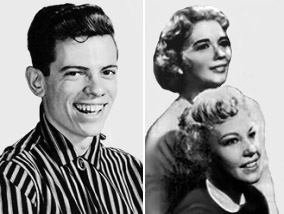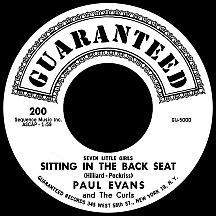PAUL EVANS AND THE CURLS
Seven Little Girls Sitting in the Back Seat
A combination of songwriting, singing and music production was how New Yorker Paul Evans built and maintained a career in a competitive show business environment. One of his many attempts at success was the 1959 recording of a nonsense novelty ditty called "Seven Little Girls Sitting in the Back Seat," a male fantasy set in a claustrophobically cramped space (in response, perhaps, to the then-popular fad of cramming as many people as possible into telephone booths). As the driver-singer, he chauffers a chick magnet named Fred who's in the process of enjoying some kind of "eightsome," 'huggin' and a-kissin'' with a gaggle of girlies despite a lack of passenger wiggle room. Who could have thought up such a song? Why would someone as ambitious as Evans agree to record it? Where'd they get the six innocent-sounding girls (plus one breathily sexy Marilyn wannabe)? And who would hand over their hard-earned money for vinyl copies of such foolery? The questions pile up!
As a child, Paul was obsessed with music and no wonder, with a dad who played the flute around the house and a mom who bragged about being a star pianist accompanying silent films in movie theaters years earlier. He reached his adolescent peak in the mid-'50s, just as fave singers Elvis Presley and Roy Orbison were rocking for Sun Records. At age 17, he began going around to nearby N.Y. music publishers, many in the Brill Building, with songs he'd written. Artist manager Stan Cooper got him on the roster of RCA Victor, where Presley was in the process of setting the music world ablaze. Paul's debut, "What Do You Know?," was a tad too adult-sounding...and bombed. "Looking For a Sweetie" and "Poor Broken Heart" leaned more teen, though neither caught on. Paul was crushed at first, an emotion that turned to elation when his song "When" (co-written with Jack Reardon) became a top ten hit for The Kalin Twins in the summer of '58.
One-and-done deals with Decca ("Oh! No!," kinda crazy) and Atco ("At My Party," kinda mushy) might have gone somewhere...but didn't. Just as he'd made up his mind to do anything it took to make it, he was persuaded to take a step back and sing on some demonstration records. Hired in '59 by Associated Recording Studios (just a few blocks away from the bustling Brill scene), he sang on dozens of demos for the "real" artists to consider. In walked Bob Hilliard and Lee Pockriss, neither a stranger to the "silly songs" concept (Hilliard's resumé included "Civilization (Bongo, Bongo, Bongo)" by Louis Prima and "English Muffins and Irish Stew" by Sylvia Sims while Pockriss had recently co-written a childishly humorous Easter oddity, "The Chick" by Lee and Paul). Their latest project was a sure-to-score ditty about nine people in one car. Paul sang lead on the demo and The Curls supplied the backseat chorus.

These Curls girls numbered two...a quintet less than the required amount to be really convincing (not to mention a video, had there been one, would have put out a casting call for seven ladies with mad skills as contortionists). Paul's role required him to plead: '...why don't one-a you come up and sit beside me?...and this is what the seven girls said...' before the Curls callously chimed in: 'All together now, one, two, three...keep your mind on your drivin', keep you hands on the wheel, keep your snoopy eyes on the road ahead...we're havin' fun, sittin' in the back seat, kissin' and a-huggin' with Fred!' One spin on the radio was usually all it took for the song to overload request lines; fans of funny songs bought up hundreds of thousands of copies (on Guaranteed, a subsidiary of Carlton Records) as the original demo, which they'd decided was perfect just as it was, spent ten weeks in the top 30 (two of those in the top ten) between October and December 1959.
A U.K. release of the single charted briefly but was overtaken by The Avons (Valerie and Elaine Murtagh, established as The Avon Sisters, and lead singer Ray Adams), whose cover spent several weeks in Britain's top ten in December '59 and January '60. Back in the States the Curls, namely Susan Terry and Sue Singleton (real name: Mary Louise Dollinger), who'd so convincingly passed for a seven-member group (lucky for them people weren't listening that closely!), obtained a contract with Everest Records as a benefit of having a top ten hit. Two singles resulted, the arrangement of "Why Didn't I Go?" not surprisingly bearing a strong resemblance to their 'Back Seat' hit. The two Sues split soon afterwards; Singleton joined The Ray Conniff Singers and appeared for several years on Perry Como's Kraft Music Hall on NBC-TV.
Paul's next two discs were hits, starting with an adaptation of the popular 19th century folk song "Midnite Special" that reached the top 20 in February 1960. It was followed by "Happy-Go-Lucky Me," an original by Evans and Brooklyn-born tunesmith Al Byron that exceeded expectations (perhaps due to Paul's slightly-delirious attacks of laughter) and went top ten in June. Next came "The Brigade of Broken Hearts" ('...we never won a war in the battle of amour...'), set to a marching beat by composers Clint Ballard and Fred (the guy with seven girlfriends?) Tobias, that stalled in the lower 20 that summer. Switching to the Carlton parent label, Evans made a minor blip nationally with "Show Folk," a Hilliard-Robert Allen tune describing a reaction "country bumpkins" might have to a famous rock group. Torrid love song "After the Hurricane" did well in Vancouver, British Columbia but had little luck in the U.S.
As hit singles faded, Evans took up the slack through his songwriting, with a late 1960 top 20 hit, "I Gotta Know" by Presley (co-written with Matt Williams), followed by 1961's "Summer Souvenirs" by Karl Hammel, Jr. and "Johnny Will" by Pat Boone. With previous partner Byron, Evans had his greatest success in mid-'62 when Bobby Vinton topped the charts with "Roses Are Red (My Love)," a multi-million-selling single and worldwide smash (more than a half-century of fat royalty checks and counting!). Paul signed with Kapp at that time, remaining with the label for the better part of two years with debut "Feelin' No Pain" the only song to get attention, and little at that. He then moved to Vinton's label Epic with a vocal version of the Liz Montgomery TV sitcom theme "Bewitched" recorded with his wife, Mimi Evans.
Songwriting was his bread and butter for the remainder of the decade as he supplied hits for Johnny Tillotson ("Worried Guy") and Ray Conniff ("Happiness Is," penned with later Sesame Street contributor Paul Parnes), plus a few more for Elvis, including "Blue River" (with Tobias) and "The Next Step is Love" (with Parnes). In the '70s he produced radio and television commercials and kept the singing career going by doing some serious label-hopping, from Columbia to Ranwood/Dot to Laurie, Mercury, Big Tree and finally the Spring label, where in 1978, still composing songs with Fred Tobias, he landed a mid-chart country hit with the cute but tragically sentimental "Hello, This is Joannie (The Telephone Answering Machine Song)." The recording caused a sensation on the other side of the Atlantic and Paul Evans finally found himself in the U.K. top ten.


